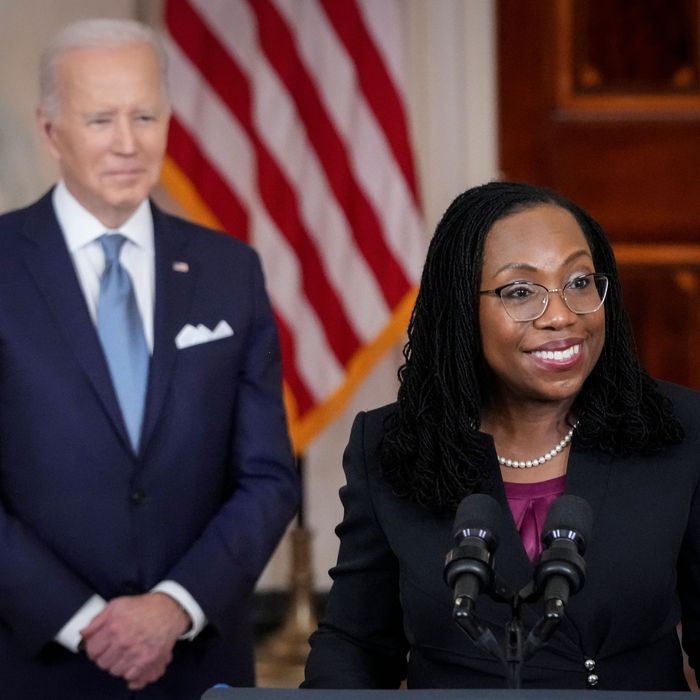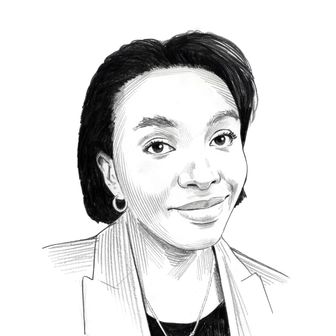
President Biden on Friday fulfilled his campaign promise to name the first Black woman to serve on the Supreme Court, nominating Ketanji Brown Jackson. If confirmed, the 51-year-old federal judge would also be only the third Black justice and sixth woman justice in the Court’s history. But she’s more than her résumé — former Supreme Court clerk, past public defender, federal judge — to hear it from her and those who have known her since she was a teenager.
She was a debate star destined for the bench
Jackson was born in Washington, D.C., and moved to Miami, the city where both of her parents were raised, when she was 3. Her father attended the University of Miami’s law school, coming home to study at the dining-room table with his law books stacked next to her coloring books, she later recalled. “There really is no question that my interest in the law began that early on,” she said during a 2017 lecture at the University of Georgia.
At Miami Palmetto Senior High School, she rose quickly to be president of the student body and soon became known as a standout member of the school’s speech-and-debate team. “She could write and give a speech that would leave the audience clapping, but she could do a dramatic play or a humorous one and she was outstanding in all those things,” says Nathaniel Persily, a former classmate and debate teammate of Jackson’s. “She is the same person today as she was at Palmetto when we were both 13.”
Persily, a law professor at Stanford, says Jackson dazzled audiences. “I remember people, when she would do the dramatic interpretation, which is the sort of serious plays, literally people crying who watched her because she was so good,” he says. “And, of course, people dying with laughter when she did the humorous ones.”
In 1988, she was awarded a national title for Original Oratory. “Picture the Simone Biles of oratory,” says Stephen Rosenthal, a former high-school classmate of Jackson’s who is an attorney in Miami, recalling her racking up trophies from tournaments as early as in tenth grade.
Jackson herself called debate “the one activity that best prepared me for future success in law and in life,” as she put it in her University of Georgia lecture. “I learned how to reason and how to write, and I gained the self-confidence that can sometimes be quite difficult for women and minorities to develop at an early age,” she said.
By the end of high school, she had already set her sights on the bench, saying in her senior yearbook, “I want to go into law and eventually have a judicial appointment.”
Persily calls Jackson “the most morally centered person” he has ever met in his life. “You look at this gold-plated résumé that she has, and you would think that she’s been trying to climb a particular ladder to get to the next rung. But she’s never been that kind of person,” he says. “She is incredibly humble. She is very generous, giving, self-deprecating — you know, the least arrogant person I’ve ever met.”
She did improv at Harvard
Jackson’s debate experience also set her on the path to Harvard, visiting campus during a national competition there. While she majored in government, she continued to dabble in theater — once being paired with Matt Damon as a scene partner during a drama class, according to the Associated Press. Outside of class, she was a member of the university’s improv troupe On Thin Ice.
“We would do rehearsals together a lot, and we’d perform in front of student audiences,” says Rosenthal, who joined her at Harvard. “And that was a really challenging thing. She brought to bear her dramatic skills. But it was, for everybody, a really tough crucible of trying to think really quickly on your feet.”
After graduating magna cum laude in 1992, Jackson moved to New York City to work for a year as a news reporter and researcher at Time magazine. She returned to Cambridge to attend Harvard Law School, where she was a supervising editor of the Harvard Law Review.
“She has a combination of personal characteristics that are so valuable. I mean, she has this remarkable combination of gifts: charisma, penetrating intelligence,” says Rosenthal. “She’s also just got unflagging integrity, and she’s a kind, humble person. Somebody like that, in a position of such public trust and power, could do so much good for the country that I can’t think of anybody who would be better for this.”
She was a clerk’s clerk
Jackson clerked for two federal judges and for Justice Stephen Breyer whose seat she has been tapped to fill. During the Supreme Court’s 1999-2000 term, she worked with other clerks on high profile cases touching on everything from abortion rights to school prayer to the rights of criminal suspects. Amanda Tyler, then a clerk for Justice Ruth Bader Ginsburg, remembers Jackson as someone who was “very calm under fire” and meticulous in her approach to the law.
“With her, what I saw was someone who was very careful and thoughtful about considering the arguments on both sides and working through them in a very methodical way but also someone who had a bigger vision — a grander vision about the Constitution and what she thought it required,” said Tyler, who is now a professor at Berkeley School of Law.
Sonja West was working for Justice John Paul Stevens when she first met the fellow clerk whom she calls a “natural leader.” They’ve remained friendly ever since. “She approaches the world with openness, honesty, and a presumption of good will in others,” West says. “These are traits I think she shares with Justice Breyer. She will always listen carefully to the views of others, but she will also never hesitate to say and do what she believes to be right.”
She would be the first public defender on the Court
Following her time with the Supreme Court, Jackson joined the grueling world of private practice, in which she struggled to balance its demands with raising two young children. “If I was going to make my life work as a lawyer and also have a family, I needed to use my legal skills in a more predictable, more controllable environment,” she told University of Georgia students as the law school’s featured speaker in 2017. “That was a realization for me.”
West was teaching law at the university when Jackson visited and says her students were struck by her friend’s candor. “What I remember most is how moved my students were by her straightforwardness about the struggles and joys of being a judge and a mother. This was not at all how they expected a federal judge to talk to them, and they loved her for it,” she says.
So she changed career tracks, first going to work with the U.S. Sentencing Commission, which determines sentencing guidelines for the federal courts, then as a federal public defender. In that role, she represented a variety of clients including Khi Ali Gul, who was challenging his detention at Guantánamo Bay. As the Washington Post later reported, she “drafted briefs challenging his detention … without charge or trial” before he was later released and transferred back to Afghanistan.
During her 2021 confirmation hearing to the D.C. Circuit Court of Appeals, she defended her role as an attorney with a “duty to represent her clients zealously, which includes refraining from contradicting her client’s legal arguments and/or undermining her client’s interests by publicly declaring the lawyer’s own personal disagreement with the legal position or alleged behavior of her client.”
After serving as a public defender, she returned to private practice for three years before Barack Obama selected her to serve as vice-chair of the Sentencing Commission; she joined her colleagues in unanimously approving guidelines that reduced the disparity in federal sentences between offenses for crack and powdered cocaine.
She is related to Paul Ryan through marriage
During undergrad, she met her husband, Patrick Jackson, a premed student, and in 1996, following law school, they got married. Together they’ve raised two daughters: Talia and Leila. Patrick is the twin brother of Paul Ryan’s brother-in-law, making Ketanji part of his extended family. During her 2012 confirmation hearing, Ryan testified in her favor, telling a Senate panel, “Now, our politics may differ, but my praise for Ketanji’s intellect, for her character, for her integrity, it is unequivocal.”
She’s been on the shortlist for years
In 2012, Obama nominated her to be a judge on the U.S. district court in Washington, and he interviewed her in 2016 to potentially fill Antonin Scalia’s vacancy before ultimately nominating Merrick Garland. In a landmark 2019 case, she ruled against the Trump administration’s challenge of a congressional subpoena for the testimony of former White House counsel Don McGahn. “Stated simply, the primary takeaway from the past 250 years of recorded American history is that Presidents are not kings,” she wrote. “This means that they do not have subjects, bound by loyalty or blood, whose destiny they are entitled to control.”
Last year, Jackson moved one step closer to the Supreme Court when Biden nominated her to fill Garland’s seat on the high-profile D.C. appeals court. She was confirmed with unanimous Democratic support and votes from Republicans Susan Collins, Lisa Murkowski, and Lindsey Graham.






























